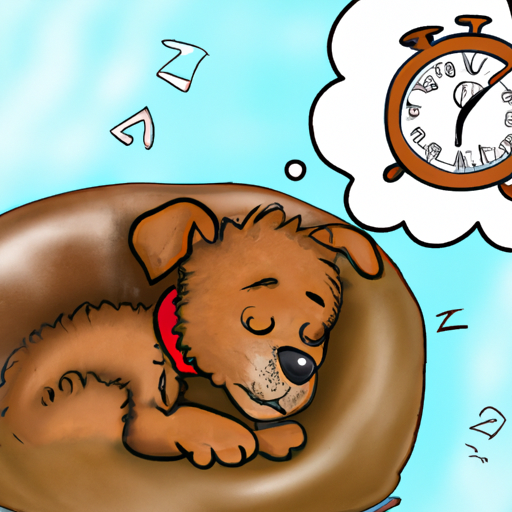When you bring home a new puppy, you may be surprised by how much they sleep. Understanding their sleep patterns can help you provide the care they need.
Understanding Puppy Sleep Cycles
Just like human babies, puppies need a lot of sleep. On average, they sleep between 18 and 20 hours a day. This might seem excessive, but it’s perfectly normal.
- Newborn Puppies: During their first week of life, puppies sleep almost 24 hours a day.
- 2-4 Weeks Old: As they grow, they start to sleep less. By the time they are a month old, puppies generally sleep 20-22 hours a day.
- 1-2 Months Old: When puppies are between 1-2 months old, they start to sleep around 18-20 hours a day.
Keep in mind that these are averages. Each puppy is unique and may sleep more or less depending on their breed, size, and individual needs.
Why Do Puppies Sleep So Much?
Puppies sleep so much because their bodies are growing and developing. When they’re asleep, their bodies are busy building muscle, making new skin cells, and strengthening their immune system.
Puppies also use a lot of energy when they’re awake. They’re learning about the world, exploring their environment, and playing with their siblings or toys. All these activities tire them out, so they need plenty of rest to recharge.
How to Establish a Sleep Schedule
Creating a regular sleep schedule for your puppy can help them adjust to their new home and promote healthy sleep habits.
- Consistency: Try to feed, play, and sleep at the same times every day. This helps your puppy understand what’s expected and when.
- Create a Calm Environment: Make sure your puppy’s sleep area is quiet, dark, and comfortable. This will help them to relax and fall asleep more easily.
- Limit Late Night Play: Playing with your puppy late at night can make them too excited to sleep. Try to wind down in the evening with calm activities like cuddling or gentle petting.
Common Sleep Problems in Puppies
Just like human babies, puppies can have sleep problems. These can include:
- Restlessness: If your puppy is having trouble settling down, they may be overstimulated or anxious. Try creating a calmer environment and establishing a regular sleep schedule.
- Waking Up at Night: Puppies often need to go to the bathroom in the middle of the night. If your puppy is waking up often, try taking them outside right before bed.
- Excessive Sleepiness: If your puppy is sleeping more than 20 hours a day and seems lethargic when awake, they may be unwell. It’s a good idea to consult a vet in this case.
How to Help Your Puppy Sleep Through the Night
Helping your puppy sleep through the night can be a challenge. Here are some tips:
- Establish a Routine: Having a regular bedtime routine can signal to your puppy that it’s time to sleep. This might include a final bathroom break, a calm play session, and then settling down in their bed.
- Provide Comfort: Some puppies sleep better with a soft toy or blanket that smells like their mother or littermates. Providing this can help them feel more secure.
- Ignore Whining: If your puppy whines at night, it’s important to ignore them. Responding only teaches them that whining gets your attention.
The Impact of Sleep on Puppy Development
Sleep plays a vital role in puppy development. It’s during sleep that puppies process what they’ve learned, grow physically, and build their immune system.
| Age | Sleep Need |
|---|---|
| Newborn – 4 weeks | 20-22 hours |
| 1-2 months | 18-20 hours |
| 3-6 months | 16-18 hours |
Sleep deprivation can lead to a range of problems, from impaired learning ability to behavioral issues. Therefore, ensuring your puppy gets enough sleep is vital for their overall wellbeing.
Frequently Asked Questions
1. How long does a puppy sleep at night?
Puppies usually sleep for about 5-6 hours at night, although some may sleep longer. As they get older, they’ll gradually start to sleep more at night and less during the day.
2. Can a puppy sleep too much?
While puppies need a lot of sleep, sleeping too much can sometimes be a sign of illness. If your puppy is sleeping more than 20 hours a day and seems lethargic when awake, it’s a good idea to consult a vet.
3. Should I wake my puppy up to pee at night?
During the first few months, you’ll probably need to take your puppy outside to pee during the night. However, as they get older and their bladder control improves, they should be able to sleep through the night without needing to go out.
4. Should I let my puppy sleep with me?
It’s a personal decision. Some people find that sleeping with their puppy helps them bond and provides comfort for the puppy. However, it can also make training more difficult and may disrupt your sleep.
Remember, sleep is a vital part of your puppy’s development. By understanding their sleep needs and establishing good habits, you can help your puppy grow into a healthy, happy adult dog.



